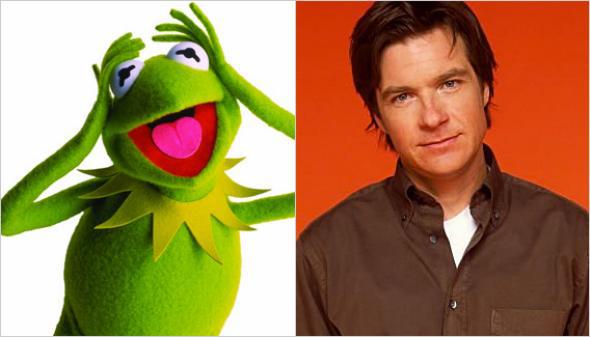For most of Muppets Most Wanted, Kermit has been replaced. Constantine, the world’s most dangerous frog, has traded places with him, sending him off to a Siberian gulag, merely by slapping a mole on our Muppet hero and slopping a little green cover-up on his own dastardly face. Upon his arrival at the Big House, Kermit’s fellow inmates realize right away that he isn’t the criminal mastermind. (Simply using the words “thank you” gives him away.) Kermit is positive that his fellow Muppets will notice the switcheroo, too, and he waits for them to rescue him. And yet they don’t come. His happy-go-lucky family of misfits, of the ones he comforts and cajoles and supports, fails to realize that he’s even gone.
This reminded me of a very similar failure from another dysfunctional clan: the Bluths. Specifically, during a Season 2 episode of Arrested Development, Michael, fed up with his family of ungrateful weirdos, flounces off to Phoenix with his son in tow. But when he calls home and asks for himself, pretending to be a doctor, it becomes clear that his kin have completely missed his act of protest. They didn’t even realize he’d left.
Unlikely though it may be, Michael Bluth and Kermit the Frog are kindred souls. In fact, most Muppet tales could be summed up as the story of a puppet-family who lost everything, and the one frog who tried to keep them all together.
Kermit and Michael are both the straight man, the calm one, the dependable one, the one who can reach into a maelstrom of bad ideas and figure out which could be put to good use. (Oh, and they both love to ride bikes.) Being the stalwart may be less fun than, say, dancing with chickens, or doing a chicken dance to mock someone’s cowardice. But someone has to do it, and each derives pleasure in seeing himself as the savior of the group.
But they are both less superior than they think.
Michael would have viewers think that were it not for his family, he would be at the rudder of a solvent, responsible, ethical business. But as we saw in Season 4 of Arrested Development, without them around to hold him back, he ends up no better than those he disdains, mooching off his son, playing at getting an online degree. He becomes a little Gob, a little Buster. For all his worship of that “sweet sting of sweat in your eyes,” he’s easily discouraged: He flees Phoenix, which he’s long held as a promised land, because he literally can’t stand the heat.
Kermit, too, isn’t quite the savvy businessfrog he might consider himself. As Bradley Diuguid explained on the theater site HowlRound, in a blog post titled “Why Kermit Is a Bad Producer”:
Kermit is a self-defeating nebbish in business matters. He’s always been put-upon, stressed, even introverted. That nerdiness is what makes him a great straight man, a sincere performer, and a deeply relatable personality. … [B]ut he’s just not a force in the room. He’s too easily discouraged when he’s told “no.”
Kermit is consistently positioned as a leader without delegating responsibilities or accountability. It’s not clear whether this is by necessity or choice—whether Kermit’s head hangs heavy with the crown, as the only one even remotely willing to step up, or whether he distrusts his colleagues’ competence.
It’s a little of both—for both Kermit and Michael. OK, their families have proven their incompetence and distractibility over and over, but we never really see them try to bring in outside help—unless it’s an evil producer/oil baron, for the Muppets, or a possible long-lost sister, for the Bluths. They’re too invested in being the Guy Holding Everything Together.
Whether they’re talking about being green or running the banana stand, it ain’t easy being them. And deep down, they wouldn’t have it any other way.
